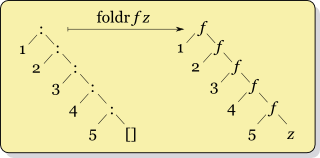
This question is about functional programming. It assumes prior knowledge in at least one purely functional language.
A polynomial
$$
a_nx^n + a_{(n - 1)}x^{(n-1)} + \cdots + a_1x + a_0
$$
with integer coefficients \(a_0, a_1, \dots, a_n\) can be represented by a list or list-like structure (depending on the programming language of choice). For example,
$$
p(x) = 5x^3 - 7x^2 + 2x + 10
$$
translates into the list [10, 2, -7, 5]. (From left to right, one starts with the constant term and finishes with the leading coefficient.) Now consider a function eval(), which takes an integer \(x_0\), and a list of coefficients \(a_0, a_1, \dots, a_n\), and evaluates the polynomial \(a_nx^n + \dots + a_1x + a_0\) at the point \(x_0\). Below are two implementations of this function, one in OCaml, and one in Haskell.
| OCaml | Haskell |
|---|---|
|
|
There is, however, a more efficient algorithm for this, known as Horner’s method. Using repeated application of the distributive law, we can derive the following sequence of progressive rearrangements of the expression: $$ a_0 + a_1x + \cdots + a_nx^n \\ = a_0 + x(a_1 + a_2x + \cdots + a_nx^{(n-1)}) \\ = a_0 + x(a_1 + x(a_2 + a_3x + \cdots + a_nx^{(n-2)})) \\ = a_0 + x(a_1 + x(a_2 + x(a_3 + \cdots + x(a_n + 0) \cdots ))) \\ $$
This lends itself naturally to a list processing pattern in functional programming, known as a fold. The fold (or reduce) family of higher-order functions reduces a collection to a single value using a combining function, and an initial value (named \(z\) in the below diagram).

In OCaml, List.fold_right has the type signature
('a -> 'b -> 'b) -> 'a list -> 'b -> 'b
and Haskell's foldr
foldr :: (a -> b -> b) -> b -> [a] -> b
(here specialized to lists) serves the same purpose.
Write, or sketch out, a function that
eval() but
Below is an implementation of eval in Haskell. (foldr1 is a variant of foldr with no base case.)
eval' :: (Num a, Foldable t) => a -> t a -> a
eval' x = foldr1 f where f a c = a + x*c